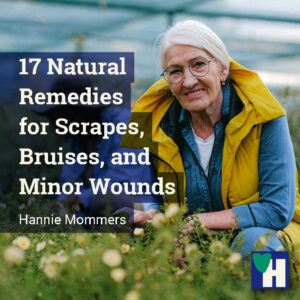
When we’ve worked in the garden or accidentally scraped along a rough wall, there are often some small wounds on our hands and arms.
You shouldn’t be too scared of this. Regular scratching ensures that your immune system remains activated. However, you must ensure that the wound is clean to prevent infection.
And if it itches or hurts, there are many natural remedies for scrapes and bruises that can relieve the inconvenience and even stop bleeding. You can buy a homeopathic remedy such as Calendula ointment or use something from nature.
This article is about the latter, and you can read more about Calendula ointment here.
Some of the links are affiliate links. As an affiliate associate, we earn a commission when you purchase any of the products offered through the shared links at no extra cost for you. This helps us maintain this website.
Table of contents
Natural remedies for scrapes, cuts, and bruises
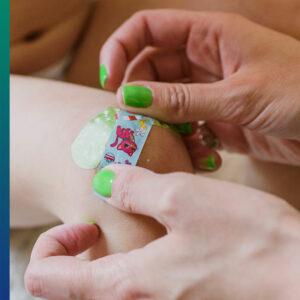
Sure, it’s nice when the grandkids hurt themselves to put a Sesame Street band-aid on it. However, this contains plastic, which we prefer to use as little as possible.
Fortunately, cutting off a plant and smearing the juice on the wound is also very exciting for them and makes them quickly forget their grief. The same result gives a grab out of the vegetable drawer or the kitchen cupboard.
In the garden
Chamomile
Chamomile or Matricaria has a calming effect. Here in Spain, you can order a chamomile tea – una Manzanilla – in every cafe and we also often drink it at home. Press a wet tea bag on the scrape or put on a cotton pad with loose tea on top of it.
It’s an easy herb to grow either inside the house or in the garden.
Related: Grow your Own Herbs Indoors or Outside for Quality Herbal Tea
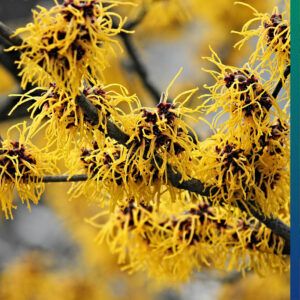
Witch-hazel
A deciduous shrub whose bark and leaves are used for minor skin lesions. They are an astringent used to cleanse and disinfect the skin. It can also be used to treat sore muscles and swollen tissue.
Minor infections, such as on the gums or laryngitis, benefit from witch-hazel. Little can go wrong with putting something on your skin, but it’s good to be careful before intake. Consult a doctor first.
Yarrow
Yarrow leaves are dried and ground into a powder, which is used to disinfect cuts and scrapes, and can stop the bleeding of a wound because of the tannins. The plant has been used for centuries. It is also used as a drink for stomach disorders and digestive disorders.
Like most plants, yarrow has several application possibilities. Apart from the treatment of scrapes, it helps cramped and swollen muscles. Like chamomile, it is relaxing. Some use it in soap or shampoo.
Related: Why do you have a Soap Allergy? What are Promising Solutions?
Comfrey
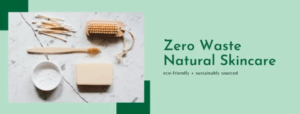
Comfrey is a perennial plant used to treat strains, sprains, bruises, and even fractures. Grind the roots of the plant into a compress and apply it to the injured area.
Arnica
Arnica is prepared from the dried rhizome. It has a beneficial effect on bruising and swelling. Be careful not to put it on open wounds.
Arnica oil is great for massaging stiff muscles. It warms, although it does not get as warm as tiger balm, for example.
Garlic
Some people don’t like the smell of garlic, yet it is such a healthy tuber. We eat it almost every day to purify the blood and detox our bodies. Garlic is antiseptic and anti-microbial. Crush some cloves and put them on the minor wound to disinfect it.
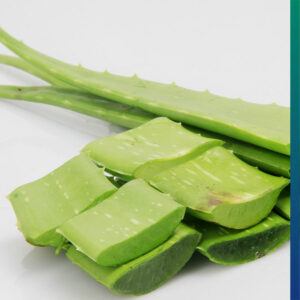
Aloe Vera
The Aloe Vera plant juice, or rather the gel, is often used in cosmetics. It moisturizes the skin. In addition, the juice from a fresh cut is ideal for relieving sunburn. Some people drink it every day for health reasons.
It’s succulent that grows in a warm climate. Two years ago I got a few cuttings of Aloe Vera that I put in pots. They grow like crazy and have already produced many new cuttings. They are even in bloom at the moment.
If you apply a thick layer, it is ideal for collagen formation.
Related: Animal Collagen vs Plant Collagen – Is there a Significant Difference?
Onion
Put some strips of the onion on the wound to clean and disinfect it. Onion can stop the bleeding from small wounds.
In the kitchen cupboard
Turmeric
Turmeric or curcumin is a natural antibiotic and antiseptic spice. Apply it on the wound to disinfect. It is one of the superfoods and very healthy to eat or drink.
Related: Yellow Foods that Boost your Immune System Naturally
Cinamon
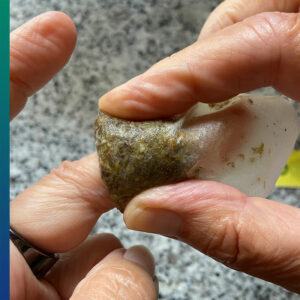
Sprinkle a little cinnamon on a scratch to disinfect it, unless the wound is dirty. In that case, you have to clean the wound first. Be careful not to use too much cinnamon as it can hurt as well.
Honey
Raw honey has been used as wound treatment for centuries due to its anti-bacterial qualities. Put a thin layer on the wound and cover it with a bandage.
Coconut oil
Coconut oil is one of my favorites. I use it a lot to cure my eczema or if I have itching spots. Because of its antifungal and antibiotic properties, it’s great to treat small cuts.
Related: Why is Coconut Oil good for your Skin, Hair and Body?
Baking soda
Take a bath with a bit of baking soda in the water to soothe the pain of bee or insect stings. You can even put a few drops of essential oil in it, like thyme, lavender, or chamomile.
In everyday life
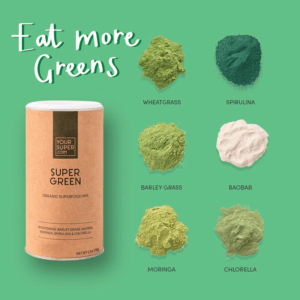
Diet
Healing cuts and scrapes take energy, so make sure you eat a healthy diet and don’t lose weight during the healing process.
Your body uses protein as a building material to heal damage. It is advisable to eat some extra lean protein foods.
Eat foods with quercetin, such as citrus fruits, pineapple, onions. Foods with vitamin K, like spinach and kale. Zinc-rich food, which is high in nuts and seeds.
R.I.C.E.
R.I.C.E. means rest, ice, compress and elevate. Opinions are divided as to whether it is best to rest or to keep moving after an injury. Listen to your body and act accordingly.
Essential oils
Several essential oils are great to treat damaged skin. It’s usually best to combine or dilute the essential oil with an agent oil like extra virgin olive oil or jojoba oil. Tea Tree, Helichrysum, Peppermint, Lavender essential oil have great antibiotic qualities.
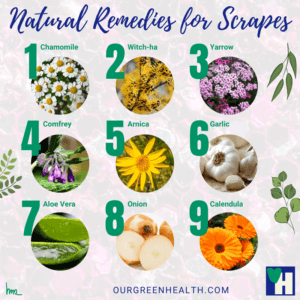
Related: Natural Organic Essential Oils and How to Use Them
Make sure you only use plants and substances you know and check regularly for signs of infection (redness, pain, swelling, itching).
I am not a doctor, nor a herbalist. Some of the provided information here I know from my own experience and courses, the rest comes from research in books and the internet. As with everything that concerns your health: when you are in doubt, consult a physician. Better safe than sorry.
How do you treat scrapes and scratches? Tell us in the comment box below.

I’ve used yarrow leaves in the past with quite satisfactory results, but I wasn’t aware of all the others that you pointed out until now. A fantastic read, I will definitely be checking out a few from the list especially the chamomile for the added calming benefit, and the arnica for stiff muscles. I consume a lot of garlic on a daily basis in my foods, and just realized how beneficial that is from reading this article.
Exactly, Orion, garlic purifies the blood, making it healthy to eat with or without bruises and cuts. I can’t believe I hated it that much when I was a child. It was a typical example of (Dutch expression) “What the farmer doesn’t know, he doesn’t eat”. 🙂
The funny thing about chamomile is that when I was young, I used it to wash my hair. It made the color lighter of the blonde I was and was healthy at the same time. Nowadays I drink it. Not needed anymore to make the blonde lighter as I am all grey now, LOL.
Thanks for stopping by and reacting. Take care.
I love finding articles about using natural remedies. My boys often refer to the fact that they grew up on arnica, because whenever they had a fall or a bump, the arnica would come out. And almost as soon as they had the tiny little pill, the tears would stop. And of course far less swelling and bruising.
I have an aloe vera plant outside my back door and have used it for minor cuts and burns, and it certainly works. I did not know though that I can brew it as a tea. And the same goes for turmeric, love using it for cuts, and yes you might have yellow skin, but it heals far quicker than treating it with chemicals.
You have mentioned several natural remedies that I was not familiar with, so thank you for this great educational read.
That is so recognizable, Lina, what was arnica to you and your family, is the calendula ointment to us. I use it on the age spots I have and even old scars pull away when I remember to smear them on a regular basis. Nature is so wonderful and these remedies are so simple, yet so good, aren’t they?
Aloe vera is great for a number of reasons. I don’t like the taste of it, so I don’t drink it. I tried, of course, when I heard from a friend she drinks it every day, but no. I don’t know if it’s only the taste or also the slimy substance. I should try it again with mixes of some kind, I guess. 🙂
Thanks for your comment and take care.
So sweet of you to put this information on one post. Thanks for sharing this.
I am a natural remedy fan. Although I still stick to my doctor’s scheduled monitoring and prescription.
For my own story, I put a lot of garlic and onion into our meals. I treat my kids’ itchy insect bites with garlic. And for my personal use, I use fresh Aloe Vera for my face and my hair. That is on an alternate week with virgin coconut oil. I do this to avoid dandruff, soften my hair, and refresh my face.
I am making my own virgin coconut oil at home. I also use virgin coconut oil for scrapes, bruises, and minor wounds. Also, I use it as a massage oil for headaches and muscle pain.
You’re welcome, Rose, and you do the right thing to also listen to your doctor.
Aren’t you clever to make your own virgin coconut oil, wow. How do you do that? Are there many fresh coconuts available where you live? And thanks for your tip about using it against headaches! I didn’t know that helps, so I’ll sure going to try it.
Thank you so much for your valuable additions and take care.
Some amazing tips over here. Thanks for them! In my country, we use “rakija” for many different injuries. Mostly, it’s for some scratches, cuts, and inflammations. It’s a brandy made from grape or some other fruits.
It’s like a natural remedy for everything, haha. But I’m definitely going to try some of the things you recommended above.
LOL, yes, Petar, some alcoholic substances are great for treating minor wounds as well. I bet that the Spanish over here use some of their alcoholic beverages the same way. And if it’s not good for the wound you could always numb yourself by drinking it. Oops, I didn’t say that! 😉
Thanks for your comment and stay healthy (and sober!) 🙂